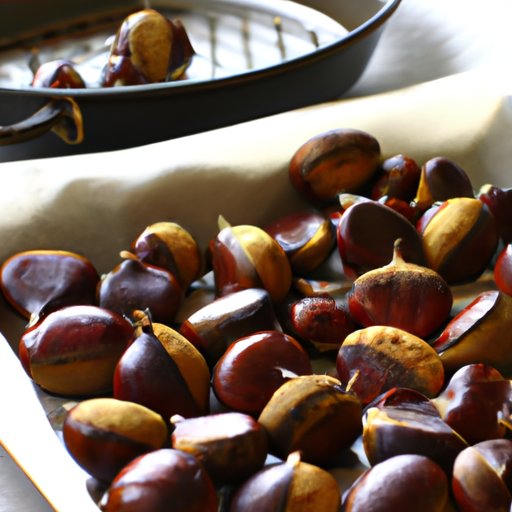
I. Introduction
Chestnuts are a beloved ingredient used in a variety of dishes, ranging from savory to sweet. Not only are they delicious, but they are also incredibly nutritious, containing high levels of vitamins and minerals. In this article, we will take a closer look at chestnuts, exploring the different ways they can be cooked and the cultural significance of this versatile ingredient.
II. A Step-by-Step Guide to Roasting Chestnuts
Roasting chestnuts is a popular way to enjoy this ingredient, especially during the holiday season. To roast chestnuts in the oven, start by preheating the oven to 400 degrees Fahrenheit. Use a sharp knife to make an X on the flat side of the chestnuts, then place them on a baking sheet. Bake for 15-20 minutes until the skins start to peel away. For open fire roasting, place the chestnuts in a chestnut-roasting pan or wrap them in aluminum foil. Cook them over medium heat for 15-20 minutes, shaking the pan occasionally. Some seasoning options to enhance the flavor of roasted chestnuts include sea salt, cinnamon, and nutmeg.
III. Chestnut Soup Recipe Ideas
Chestnut soup is a creamy and nutritious option that can be enjoyed as a meal by itself or as a side dish. To make chestnut soup, start by sautéing onions, celery, and garlic in a pot. Add in peeled and diced chestnuts and simmer with chicken or vegetable broth for 30-40 minutes. Blend the mixture until smooth, then add in cream or milk to create the desired consistency. Some variations of chestnut soup from different cultures include French-style chestnut soup with creme fraiche and Italian chestnut soup with pancetta and rosemary.
IV. Sweet Chestnut Dessert Recipes
Sweet chestnut dessert is a creative and unique way of using chestnuts in cooking. To make chestnut truffles, start by combining chestnut paste with melted chocolate and butter. Roll the mixture into balls, then coat them in cocoa powder. For chestnut-flavored cake, mix chestnut flour with almond flour, sugar, and eggs to create the batter. Bake the cake until it is golden brown, then top it with whipped cream and shaved chocolate. Sweet chestnut desserts have a historical and cultural significance in different regions, such as chestnut mousse in Portugal and Mont Blanc cake in Italy.
V. Making Chestnut Flour
Chestnut flour is a gluten-free and nutritious alternative to wheat flour. To make chestnut flour, start by roasting and peeling chestnuts. Grind the chestnuts in a food processor or coffee grinder until they become a fine powder. Chestnut flour can be used in a variety of baking and cooking recipes, such as pancakes, pizza dough, and bread.
VI. Regional Chestnut Dishes from Around the World
Chestnuts have a significant cultural importance in different regions, and they are used in a variety of regional dishes. In Korea, chestnuts are used in a popular rice cake dish called Songpyeon. In France, roasted chestnuts are a popular snack during the winter season. In Italy, chestnut flour is used to make a traditional pasta called Castagnaccio. Exploring regional chestnut dishes is a great way to experience the diversity of this ingredient and to learn about different cultures.
VII. Conclusion
In conclusion, chestnuts are a versatile and nutritious ingredient that can be used in a variety of cooking and baking recipes. From roasting to making flour, there are countless ways to enjoy this beloved ingredient. By exploring different chestnut recipes from around the world, readers can also learn about the cultural significance and history associated with chestnuts. So, the next time you’re at the grocery store, pick up some chestnuts and start exploring the world of chestnut cuisine.





